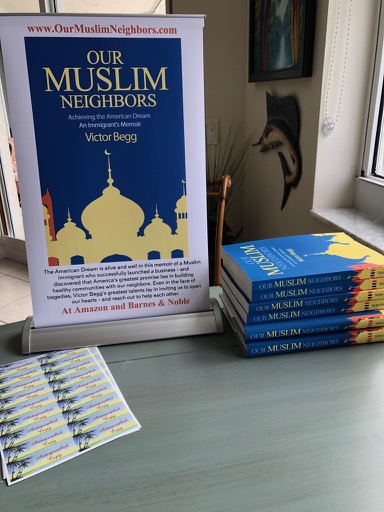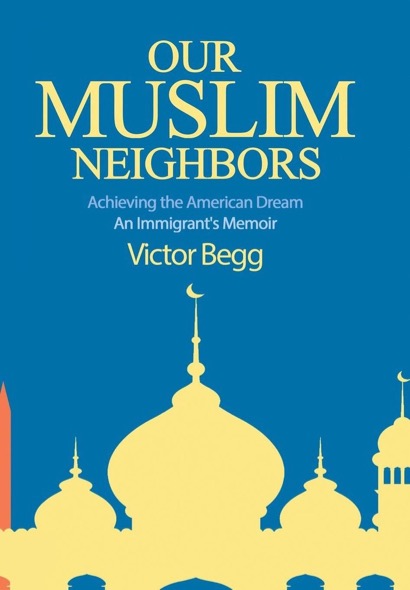“This is what interfaith understanding and friendship is supposed to look like.”
American religion columnist Bill Tammeus in a new column this week
“This book’s importance really is global, considering how often migrants, refugees and Muslims in particular are demonized by extremists around the world. Victor Begg backs up his argument that Muslim migrants benefit American communities with examples from history as well as solid research data. Then, what makes this book most convincing to readers is the simple narrative of his own life as a community builder.”
Algeria-based journalist Larbi Megari, a leader in the International Association of Religion Journalists
By DAVID CRUMM
Editor of ReadTheSpirit Magazine
Join all of us at our publishing house in making this New Year’s Resolution: Meet a Muslim.
Most Americans have never actually met our millions of Muslim neighbors. It’s time to change that. If we do reach out, we usually discover new friends with similar values—and the entire community is enriched by our new friendships.
This week, we are making this process easier than ever before. You can meet Victor Begg, his wife Shahina and their entire family in the engaging new memoir, Our Muslim Neighbors—Achieving the American Dream, an Immigrant’s Memoir. Victor welcomes readers into a fascinating family story in which readers are likely to recognize the personalities of their own mothers, fathers and other family and friends.
Readers certainly will recognize their core American values and will enjoy reading about Victor’s courageous attempts to live out those values, sometimes in the midst of tragedy.
“This is a true blue American story—my story of how I came to this country and built a successful business and a life for my family that contributed to our community in so many ways,” Victor said in an interview this week. “Along the way, I realized that most Americans don’t know any Muslims and that heightened bigotry arises because people don’t know that our families are just like their families. We share so many community and spiritual values—and we would discover that if we simply reached out—if we simply got to know each other.”
That’s also what Bill Tammeus, one of the most respected religion writers in the U.S., concluded after reading Victor’s book. Here’s a sample of what Bill wrote (and what already has been reposted for readers around the world on the huge Islamicity web hub):
This is a highly personal story, but Begg’s experience and thinking can encourage all Americans to get to know their Muslim neighbors—to say nothing of neighbors of all other (and no) religious traditions. When people are religiously illiterate, it can lead to fear, which can lead to hate, which can lead to violence. We’ve been there before. This book is a helpful road map in a better direction.
NOTE—Victor’s book will be released this week (on February 5, 2019) and can be ordered right now in paperback and hardcover, as well as Kindle, from Amazon. The book also is in paperback and hardcover from Barnes & Noble. You can also order a copy directly from the Front Edge Publishing house in paperback or hardcover.
BY THE NUMBERS—
WHY MEETING A MUSLIM MATTERS

Author Victor Begg is an experienced public speaker and group leader. He’s already scheduling appearances across the U.S. Contact him via his website if you’re interested in inquiring about his schedule.
We’re urging you to talk with friends about this book. Tell them about the importance of getting to know a Muslim neighbor. Perhaps you’re a member of a congregation with a small group or class that could read and discuss this book—to encourage friendly interactions in your friends’ neighborhoods and workplaces.
So, how do you convince friends of the importance of taking this step?
Here are some facts (and links you can follow) to help you make a persuasive request:
First, the Pew Research Center has conducted the largest single body of ongoing research into attitudes among Muslims around the world—and attitudes toward Muslims in the U.S. You can search the vast Pew website for the latest news, starting at Pew’s web hub on Muslim Americans.
One very helpful starting point is this report from 2017 that describes how important it is to interact with Muslims in a friendly way. You’ll learn how much these neighbors appreciate the kindness of a cordial greeting. Pew researchers report that “49 percent of Muslim Americans say someone has expressed support for them because of their religion in the past year. And 55% think Americans in general are friendly toward U.S. Muslims, compared with just 14% who say they are unfriendly.”
In fact, the report shows, when neighbors have friendly conversations, they discover that the vast majority (that’s 89 percent!) of American Muslims say they are both proud of their faith and proud to be American.
In his new book, Victor’s description of his “true-blue American” approach to life is not an unusual experience. In fact, Victor is expressing the widespread viewpoint of Muslim families coast to coast—just as the data show.
Who Is a ‘Typical’ Muslim?
You may wonder why this memoir was written by an immigrant from India—and not an Arab-American Muslim. Is that unusual?
No, it’s not. Immigrants from India and Pakistan are among the most common Muslim newcomers in the U.S.
Here’s another helpful Pew report for answering any questions friends may have about who they should consider a “typical” Muslim family. The answer is: Muslims come from all over the globe, including from right here in the American heartland. That 2018 Pew report says, in part:
The immigrant experience is deeply ingrained in the fabric of Islam in America. Most U.S. Muslim adults (58%) hail from other parts of the globe. … They come from a wide array of countries, and no single region or country of origin accounts for a majority of them. … But the U.S.-born share of the American Muslim population is also considerable (42%). It consists of descendants of Muslim immigrants, converts to Islam (many of them black) and descendants of converts.
Evidence to Share …
Then, how do we know that meeting our Muslim neighbors will actually build a healthier community?
There are many studies—both in the form of national surveys and in the conclusions of projects conducted by universities and nonprofits nationwide—that show simply getting to know a Muslim neighbor changes one’s whole attitude.
Here is a commonly cited report you can share with friends. The highly respected Public Religion Research Institute (PRRI) reports, in part:
Relatively few Americans regularly interact with Muslims. Only eight percent report having had a conversation with someone who is Muslim at least once a day in the past year. About three in ten (29 percent) report occasional interactions with someone who is Muslim, while more than six in ten say they seldom (26 percent) or never (36 percent) have had such a conversation.
And here’s the key in the PRRI report: “Even Americans who have had conversations with Muslims at least occasionally in the past year express much more positive views of Muslims than those who report much less regular interaction.”
‘Our Muslim Neighbors’—
So, What’s in the Book?
First and foremost, this is a family story—as told by a disarmingly honest narrator, who admits his faults as well as claiming his successes. You’ll chuckle over young Victor’s introduction to American business—as a vacuum cleaner salesman! And you’ll learn how he later carved out a regional chain of stores, based on the popular trend of do-it-yourself furniture finishing.
But the Big Story here is the fact that Victor kept landing in the middle of major events in American history—like that fictional tale of Forrest Gump who keeps winding up smack-dab in the heart of current events.
Victor landed in Detroit—an international cauldron of religious and cultural diversity fueled by Henry Ford’s sprawling empire of auto-manufacturing plants. If recalling Henry Ford sounds like ancient history—you only have to scan the February 2 headlines in The New York Times to find breaking news about Henry Ford’s dark side as an antisemitic provocateur. As Victor lays the backdrop of his memoir, he summarizes that true story of Ford’s hateful campaign. He tells that controversial story to explain why starting his own career as an entrepreneur in Ford’s back yard was such a challenge for an immigrant of a “different” faith.
Victor finds himself in the center of other historic events, as well. Victor was meeting with regional leaders on the morning of “9/11.” His chapter on how Michigan—and the whole nation—was transformed as a result is a gripping, page-turning section of his book.
Years later, when Victor thought he would retire quietly in Florida, he wound up attending the same mosque once attended by a deeply troubled young man who winds up unleashing a tragic, violent assault on the Pulse nightclub in Orlando. Suddenly, Victor is back in the national spotlight as a community healer. Since then, he has decided that he can never retire from peaceful activism.
As you read his true stories, you’ll wonder: Wow! How would I have reacted in those situations? What would I have said about my own faith that might have helped people respond to such tragedy?
You’ll discover that the deepest values of Islam—compassion and justice and hospitality and generosity—mirror the foundations of Christianity and all of the world’s other great religious traditions.
In other words, just as you may recognize some of your own family members in Victor’s colorful family—you’ll also come away recognizing many of your own deepest questions and values.
Here’s how Bill Tammeus sums it up: “The point is that as America becomes increasingly pluralistic religiously, the guidance that Begg provides about how to create solid interfaith relationships is useful anywhere in the country.”
Care to read more?
ORDER THE BOOK—Victor’s book will be released this week (on February 5, 2019) and can be ordered right now in paperback and hardcover, as well as Kindle, from Amazon. The book also is in paperback and hardcover from Barnes & Noble. You can also order a copy directly from the Front Edge Publishing house in paperback or hardcover.
VISIT VICTOR’S WEBSITE—The Internet address is easy to remember. It’s simply OurMuslimNeighbors.com, which also is the title of the book.

